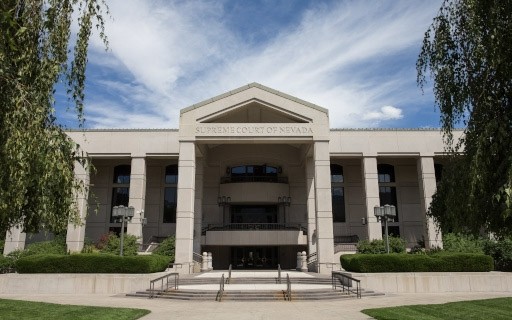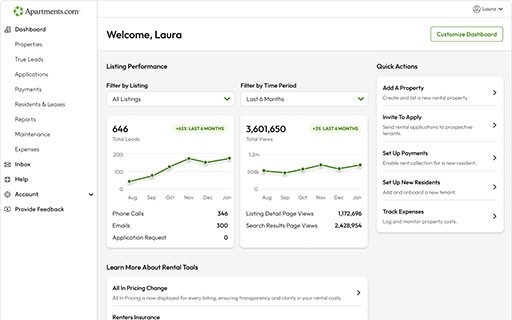
Key Takeaways of Oregon Landlord-Tenant Laws
- Rent increase: In 2025, the rent increase in Oregon is capped at 10 percent.
- Relocation assistance: Portland landlords may have to pay relocation assistance in certain cases of lease terminations and other events.
- Security deposit: Landlords must return security deposits or a list of charges and the remaining amount within 31 days.
- Tenant early lease terminations: tenants are allowed to end their lease early if they give a 90-day no-renewal notice on a fixed-term lease.
- Late fees: Late fees can start to be charged on the fifth day of rent being late, but landlords must choose from specific fee types (flat, per-day, or five-day) and clearly include them in the lease.
- Prohibited screening questions: Landlords cannot ask questions or inquire about protected categories under fair housing laws. New laws now ban asking about immigration status as well.
Oregon is a beautiful state full of opportunities that draw people in from all over the country, making it a prime place to have a rental property. However, it has strict laws, and cities often expand upon those, so you need to be prepared. To have a successful and profitable rental, find out everything you need to know about Oregon landlord-tenant laws.
Overview of Rental Laws in Oregon
Oregon has an expansive set of rental laws that affects all parts of the rental process, from screening to maintenance. To stay compliant as a landlord, you must familiarize yourself with these laws, particularly the section pertaining to landlord tenant laws of the state: Oregon Revised Statutes (ORS) Chapter 90.
Screening
There are certain categories that landlords cannot consider or can only consider if it meets certain conditions, outlined in ORS 90.303. If the landlord denies an application, per ORS 90.304, a written statement of the reasons for denial must be given to the applicant within 14 days. Reasons for denial are also included in this section, as well as what the letter must contain and other related information.
Application fees (ORS 90.295)
Oregon landlords charge screening fees, but only to cover the actual cost of screening (e.g., credit/tenant reports and reasonable staff time) and only once per applicant within any 60-day period. Before the applicant pays, the landlord must follow the written screening criteria they adopted and give the applicant written notice of:
- The fee amount
- The screening criteria
- The screening process and dispute/appeal rights
- Nondiscrimination policies
- Expected rent and deposits
- Any renters insurance requirement
- The applicant’s refund/damage rights
In addition, the landlord must also tell applicants how many similar units are or soon will be available and how many applications are pending. A fee can’t be charged if the landlord knows (absent written agreement) that no units are available, and if the property is rented before screening happens, then the fee must be refunded within 30 days.
Landlords must provide a receipt for any fee and promptly confirm each third-party screening with a copy of the vendor’s receipt.
Security deposit (ORS 90.300)
Oregon does not have a maximum limit on security deposits but does have laws regarding how they are handled. However, cities may impose limits on security deposits, so check local laws.
The landlord must give tenants a receipt and list the deposit in the written rental agreement. The deposit can only be used for unpaid rent or damage beyond normal wear and tear. A pet deposit is not allowed for service animals.
Once the tenant moves out, the landlord has 31 days to send a written list of any charges and to return any remaining deposit. If there is no damage, the entire amount must be returned to tenants within 31 days. If the landlord charges last month’s rent, then it must be used for the last month of the lease.
Rent control and rent stabilization (ORS 90.324)
The allowable annual rent increase in 2025 for Oregon is 10 percent. Landlords can raise rent once per year following the maximum annual rent increase percentage set by the Oregon Department of Administrative Services Office of Economic Analysis that comes out September 30th.
The amount is calculated by seven percent in addition to the 12-month average change in the Consumer Price Index for All Urban Consumers, West Region (All Items), or 10 percent, whichever is lower.
Rent increase notices (ORS 90.323)
Landlords cannot raise rent during the first year of renting. After that, rent increases are allowed as long as written notice is given and following the proper periods. 90 days’ notice is required and rent increases can only happen once a year.
Notices must include the amount of rent increase, the new monthly rent total, and the date the rent increase becomes effective.
For cause lease termination notice (ORS 90.392)
Landlords can terminate leases for a good reason (“for cause”) and after a written notice is given in the correct amount of time. For cause reasons include:
- Lease violations
- Nonpayment of rent (ORS 90.394)
The notice must describe the violations, include that the lease will end on the designated date at least 30 days after delivery, and, if the violation can be fixed, how it could be fixed and the date it must be done by. The earliest designated date for fixes must be at least 14 days after notice delivery.
ORS 90.396 says that only 24 hours’ notice is needed if the tenant or something related to the tenant is significantly threatening. Certain cases, like unpermitted pets or drug and alcohol violations, have specific procedures so be sure to read up on those sections.
Nonpayment of rent lease termination notices (ORS 90.394)
There are some additional points to follow when it comes to lease terminations for nonpayment of rent. Depending on the day the notice is given, the delivery periods can change:
- Eighth day of rental period=10 days’ written notice of nonpayment and landlord intent to terminate
- Fifth day of rental period=13 days’ written notice of nonpayment and landlord intent to terminate
The notice for nonpayment must include the amount of rent to be paid and the date and time the tenant has to pay it by to fix the issue. These notices can only be delivered in specific methods as outlined in that section. In addition to the nonpayment and intent notice, notice for rental assistance and support services as well as any summons, if applicable, must also be delivered before landlords can terminate (ORS 90.395).
No cause lease terminations (ORS 90.427)
Lease termination without a tenant cause is called a no cause notice and is outlined in ORS 90.427. Tenants can give landlords this notice any time, as long as it is 30 days before the designated date, but landlords do not have this same ability. Landlords can only terminate leases during the first year without a reason as long as they give written notice to the tenant 30 days in advance. After the first year, the only reasons a landlord can terminate for no-cause are qualifying landlord reasons outlined in the section, including demolishing or converting the property to a nonresidential use and repairing/renovating the unit and it will be unsafe or is currently unsafe.
If the lease is a fixed term, the same rules apply. Though if the lease end date is within the first year, landlords can end the lease without cause with written notice following proper guidelines. After a year, fixed term leases that end become a month-to-month lease unless the parties agree to a new fixed term lease, tenant gives notice, or the landlord has a landlord qualifying reason.
There are exceptions to this, so be sure to read ORS 90.427. If landlords are terminating for one of these reasons, they must specify the reason and include related information in the notice as well as the designated date at least 90 days out, and pay one month’s rent.
Fees landlords can charge (ORS 90.140)
Landlords are allowed to accept these fees, as long as they follow the applicable laws regarding them:
- Screening (ORS 90.295)
- Security deposits (ORS 90.300)
- Utility or service charges (ORS 90.315)
- Late fees (ORS 90.260)
- Lease violations and other damages(ORS 90.325 and ORS 90.401)
Late fees (ORS 90.260)
Landlords can charge a late fee starting day five of the rent not being paid and if the responsibility to pay rent, the amount, and due date is written into the lease. The amount charged can vary according to what type of late fee it is:
- Flat rate late fee; one-time, reasonable amount charged each period rent is late
- Per-day late fee: daily charge of no more than six percent the reasonable flat rate
- Five-day period late fee: fee that is five percent of the rent, charge every five days the rent is late
Renters insurance (ORS 90.222)
Landlords can make getting and keeping renters insurance mandatory for tenants as long as the amount of coverage is not more than $100,000 or the typical amount for similar properties in the same market.
Disclosures (ORS 90.305)
The landlord must disclose the following to a tenant:
- Who the owner is
- Who the property manager is
- Any legal proceedings (only if the property has less than four units)
Maintenance and habitability requirements (ORS 90.320)
Landlords must keep rental properties and common areas safe and in good condition. This includes:
- Protection from water and weather (full insulation not required)
- Working plumbing and sewer systems
- Safe drinking water
- Hot and cold running water from all faucets and appliances
- Adequate heating
- Safe electrical lighting and wiring
- Working appliances, if provided by the landlord
- Working elevators or other equipment, if provided by the landlord
- Functioning keys and locks for outer doors
- Latches on all opening windows
- Garbage containers and regular pick-up service (unless a different written agreement exists or the town does not require it)
- Walls, floors, ceilings, stairs, and railings that are in good condition
- Common areas that are safe for normal use
- Working smoke detectors (renters are responsible for replacing batteries)
- Working carbon monoxide (CO) detectors if the unit is connected to a CO source such as a vent or door (renters are responsible for replacing batteries) (ORS 90.316 and ORS 90.317)
- Common areas free from fire hazards and litter, rodents, or pests
- Alternate exit from bedroom (ORS 90.460)
If the landlord fails to adhere to habitability requirements and related obligations, then there are steps tenants can take, according to ORS 90.360, ORS 90.365, and ORS 90.368.
Entrance rules (ORS 90.322)
Landlords or the property manager can enter the rental to inspect, make repairs, or provide services. It must be at a reasonable time along with 24 hours’ notice (unless it is an emergency).
In an emergency, landlords can enter any time but must notify the tenant within 24 hours. If the tenant asks for repairs in writing, the landlord can enter as needed to do those repairs for up to seven days (longer if work is in progress). The other exception is if the tenant gives the landlord permission to enter.
Fair housing
Oregon landlords must comply with the federal Fair Housing Act (FHA) and Oregon’s own fair-housing statutes (ORS 659A and ORS 90.390). Landlords cannot discriminate based on race, color, religion, sex, sexual orientation, gender identity, national origin, marital status, familial status, disability, or lawful source of income. Oregon also recognizes protections for survivors of domestic violence in housing contexts.
These anti-discrimination rules apply to virtually all housing in Oregon. However, limited exceptions under Oregon law include:
- Shared living privacy: When renting space inside an owner-occupied single-family home with shared common areas, the bans on discrimination based on sex, sexual orientation, gender identity, or familial status do not apply.
- Opposite-sex shared facilities: A landlord may make sex-based distinctions if applying the law would otherwise require unrelated people of opposite sexes to share a bath or bedroom.
- Housing for older persons: Senior housing (e.g., 62+ only, or 55+ with at least 80% of units occupied by someone 55+) is exempt from the familial status protections. Reasonable occupancy limits are also allowed.
Lease provisions (ORS 90.220)
There are a couple of rules that leases must follow, with the main points being:
- Landlords and tenants may include any terms not barred by law (e.g., rent amount, length, rights/obligations).
- In a fixed-term tenancy, neither side can change the terms (including rent) unilaterally.
- Landlord must give the tenant a copy of any written rental agreement and all amendments.
- The agreement must disclose the smoking policy (ORS 479.305).
- If no rent amount is agreed to, the tenant pays the fair rental value.
- Rent payment basics: due without demand at the agreed time/place; periodic rent is due at the start of the period; rent can’t be due before day 1 of each period; rent increases must follow ORS 90.323.
- If an agreement doesn’t specify week-to-week or fixed-term, the default tenancy is month-to-month.
Eviction process
Formally called a Forcible Entry and Detainer (FED), landlords must follow the complex and detailed process of eviction. The general flow is:
- Give tenant a written eviction notice, including all required forms, following all laws and the lease, and adhering to all notice periods for the different types of notices
- File a complaint with the court
- Serve the tenant to notify them a case has been filed
- Attend the First Appearance and Mediation
- Go to trial. If the ruling is in favor of the landlord, the renter must move out within four days.
Remember that self-help evictions are illegal so you must follow proper eviction procedures. Any attempts to remove or prevent tenants from entering your property, whether evicting or not, is illegal under ORS 90.375. This includes shutting off utilities.
Prohibited acts
ORS 90.245 outlaws certain provisions in leases that make the tenant:
- Give up legal rights or remedies.
- Allow someone “confess judgment” against them.
- Excuse the landlord from the landlord’s own negligence or bad conduct, or makes the tenant pay for it.
- Pay any liquidated damages, except what is allowed under ORS 90.302.
It is also illegal for landlords to retaliate by any method, including increasing rent or withholding services, under ORS 90.385.
Remedies
Landlords are entitled to remedies for different acts and issues. The different situations are outlined in ORS 90.401.
What’s New in 2025: Recent Legal Updates for Landlords in Oregon
Early termination after no-renewal notice (HB 2134)
Renters can end their lease early if they are on a fixed-term agreement and the landlord has given them a 90-day notice that the lease won’t be renewed. The tenant must give the landlord at least a 30-day written notice. No extra fees or rent can be collected for the time between the date in the tenant’s termination notice and the date the tenant actually leaves the property. This rule only applies to fixed-term rental agreements made after the law takes effect.
Hold deposits (HB 3521)
Landlords can collect hold deposits but only after the tenant’s application is approved. If the lease does not go through because the tenant finds major habitability problems or the landlord does follow the lease, then the deposit must be returned within five business days.
Lock entry (HB 3378)
If the access method to the property is via a phone or other electronic device, landlords must provide another method as well that is not software. This includes access codes, fobs, key cards, or a physical key.
This measure also states that a property is only habitable if the landlord provides working locks for all entrances and functioning latches for all windows.
Screening (SB 599)
Landlords cannot ask or require tenants to answer questions about their immigration status. Only in cases where those types of questions are required by particular federal rent-subsidy programs can landlords ask that.
Local Ordinances Worth Knowing in Portland, OR
The majority of Portland’s rental laws are located in Portland City Code (PCC) 30. The city has laws that extend protections and clarify beyond the state and federal laws.
Fair Access in Renting (FAIR ordinance): Portland Renter Additional Protections (PCC 30.01.085)
Portland Renter Additional Protections covers a wide breadth of topics, including:
- Lease termination: if landlords terminate a lease for no cause or for a qualifying landlord reason, they must deliver a written notice at least 90 days prior or what is in the lease, whichever is greater. If the tenant is at fault these laws do not apply.
- Mandatory renter relocation assistance: tenants who receive a no-cause lease termination or one for qualifying landlord reasons may be entitled to relocation assistance paid by their landlord. The amount depends on the property. There are exceptions, so be sure to read all applicable laws.
- Rent increases: A landlord can’t raise rent by more than five percent over a 12-month period without giving written notice at least 90 days in advance (or longer if the lease requires), stating the new amount and start date. If the increase is 10 percent or more, and the tenant asks in writing within 45 days, the landlord must pay relocation assistance within 31 days, and the tenant then has six months to either repay and stay at the higher rent or give notice and move.
- Written notice: landlords must give tenants a written notice for rent increases or lease terminations at least 90 days prior to the effective date. The notice must include the tenant’s rights and obligations and the amount of relocation assistance they could receive.
These are just the main protections; research all provisions and their nuances in PCC 30.01.085.
Application and screening: Evaluation of Applicants for Dwelling Units (PCC 30.01.086)
These laws regard application and screening laws that landlords must follow.
- 72-hour notice of unit availability: landlords must give 72 hours’ notice of unit availability before they accept any applications. This notice must include when they will start accepting applications, if the unit is accessible or not, if there is a screening fee, and if so, the amount and description of the criteria.
- Applications must include:
- Checkbox to disclose disability status
- City notice about modification/accommodation rights
- Statement of Applicant Rights & Responsibilities
- Description of screening criteria if fees are charged
- Space to attach supplemental evidence, if applicant wants to
- Application process: landlords can process multiple applications but has to accept, conditionally accept, or deny in the order they get the applications. This means that landlords must record the date and time they get each completed application.
- Vacancy waitlists: if the landlord has a vacancy waitlist, names must be placed in the order they were received.
- Screening fee limits: in addition to ORS 90.295, there are limits placed on screening fees depending on how the screening is done.
- Screening done through screening company: no more than what the company charges.
- Some screening done through screening company: no more than what the company charges, in addition to 25 percent.
- Screening done by landlord: no more than the cost for a screening company in the Portland area, in addition to 10 percent.
- Financial responsibility: multiple tenants can choose who will be financially responsible and only those people can be screened for finances. Note that other applicants can be screened for conduct and property care.
- Income limits
- If rent is less than 80 percent of the median family income (MFI), then the required income can be up to 2.5 times the rent.
- If rent is more than 80 percent of the MFI, then the required income can be up to two times the rent.
- Timing: within 2 weeks of the screening being completed, landlords must send a letter of acceptance, conditional acceptance, or denial with explanation.
City’s Rental Housing Security Deposit Ordinance (PCC 30.01.087)
The max amount for security deposits depends on if the landlord requires prepayment of the last month’s rent. If so, then the deposit can only be half a month’s rent. Otherwise, the max is one month’s rent, with some exceptions. Deposits and any prepaid last month’s rent must be placed in a separate bank account identified in the lease within two weeks, and any interest earned must be returned at move-out.
Deposits may cover tenant-caused damage and reasonable costs to restore the unit to its move-in condition, and for items itemized in the lease, but not routine maintenance, ordinary wear and tear, or other not allowable items. A photo-documented Condition Report establishes the move-in baseline (tenants have seven days to submit an addendum), and landlords must update it during the tenancy if anything changes.
Within one week after the tenancy ends, the landlord must conduct a final inspection with the tenant. Any remaining security deposit and accrued interest must be returned within 31 days, accompanied by a written notice of the tenant’s rights and a written accounting that follows ORS 90.300 (12).
Residential Rental Registration Program (PCC 7.02.890)
The Residential Rental Registration Program requires that all rental properties be registered and filed. Forms must be filed each year, and the registration fee must be paid. The due date is usually April 15.
Keep Rental Compliance on Track with Apartments.com
Staying on top of landlord obligations isn’t easy when you’re also marketing units, screening applicants, collecting rent, and handling repairs. Organization and consistency are key, and the right platform makes both a lot simpler.
Apartments.com offers an integrated set of Rental Tools that streamlines daily tasks while supporting compliance at each stage of the leasing cycle. From posting listings and processing applications to rent collection and maintenance tracking, you can centralize your workflow, apply fair and consistent processes, and keep clean records aligned with your business goals.
This content is for informational purposes only and should not be construed as legal, financial, or professional advice. For guidance specific to your circumstances, consult a qualified attorney or relevant professional.
FAQs
Can landlords charge a late fee?
Landlords in Oregon can charge a late fee as long as it is in the lease and it follows state and local laws.
How much time does a landlord have to give a tenant to move out in Oregon?
Per state laws, landlords must give tenants 30-days’ notice of lease termination. However, Portland and some other cities have laws that stipulate longer periods, such as 90-days’ notice.
Do landlords have to pay for relocation in Oregon?
While Oregon has no statewide statue for relocation assistance, some cities, like Portland, do. This means that if you terminate a lease for no cause or other qualifying landlord reason, then you may have to pay your tenant relocation assistance. If your tenant accepts this relocation assistance, they must move out or return the money.
What are tenants responsible for?
Just as landlords have a responsibility for maintenance and maintaining habitability, tenants also have duties under ORS 90.325:
- Using rental property as intended
- Keeping property clean and free of garbage, clutter, or anything that could attract pests
- Keeping the kitchen clean
- Taking the trash out regularly
- Not bringing in anything infested with pests
- Keeping sinks, toilets, showers, and bathtubs clean
- Cleaning up after pets or service animals
- Not making any excessive noise
- Testing smoke detectors and carbon monoxide detectors every six months and changing batteries when needed
- Not damaging or destroying the rental property on purpose or carelessly
How late can rent be in Oregon?
While there isn’t an outlined grace period, landlords can start charging late fees on the fifth day that rent is late.











